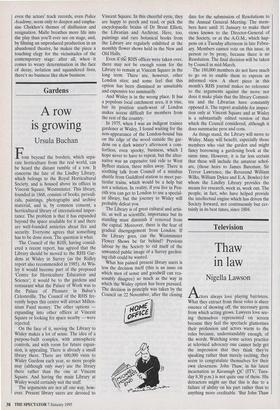Gardens
A row is growing
Ursula Buchan
rom beyond the borders, which sepa- rate horticulture from the real world, can be heard the distant rumble of a row. It concerns the fate of the Lindley Library, which belongs to the Royal Horticultural Society, and is housed above its offices in Vincent Square, Westminster. This library, founded in 1868, consists of books, periodi- cals, paintings, photographs and archive material, and is, by common consent, a horticultural library of international impor- tance. The problem is that it has expanded beyond the space available for it and there are well-founded anxieties about fire and security. Everyone agrees that something has to be done soon. The question is what.
The Council of the RHS, having consid- ered a recent report, has agreed that the Library should be moved to the RHS Gar- dens at Wisley in Surrey (as the Ridley report also recommended in 1985). At Wis- ley it would become part of the proposed `Centre for Horticulture Education and Science'; it would be to the gardens and restaurant what the Palace of Work was to the Palace of Pleasure in Babar's Celesteville. The Council of the RHS fer- vently hopes this centre will attract Millen- nium Fund money. The other options expanding into other offices at Vincent Square or looking for space nearby — were rejected.
On the face of it, moving the Library to Wisley makes a lot of sense. The idea of a purpose-built complex, with atmospheric controls, and with room for future expan- sion, is appealing. There is already a small library there. There are 600,000 visits to Wisley Gardens each year, so more people may (although only may) use the library there rather than the one at Vincent Square. And having the main Library at Wisley would certainly suit the staff.
The arguments are not all one way, how- ever. Present library users are devoted to Vincent Square. In this cheerful eyrie, they are happy to perch and read, or pick the encyclopaedic brains of Dr Brent Elliott, the Librarian and Archivist. Here, too, paintings and rare botanical books from the Library are regularly exhibited at the monthly flower shows held in the New and Old Halls.
Even if the RHS offices were taken over, there may not be enough room for the Library to remain at Vincent Square in the long term. There are, however, other London sites; and some feel that this option has been dismissed as unsuitable and expensive too summarily.
And Wisley is in the wrong place. It has a populous local catchment area, it is true, but its position south-west of London makes access difficult for members from the rest of the country.
In 1975, when I was an indigent trainee gardener at Wisley, I found waiting for the non-appearance of the London-bound bus on the edge of the wood outside the gar- dens on a dark winter's afternoon a com- fortless, even spooky, business, which I hope never to have to repeat, but the alter- native was an expensive taxi ride to West Byfleet station, three miles away. There is soothing talk from Council of a minibus shuttle from Guildford station to meet par- ticular trains, which would be a help but not a solution. In reality, if you live in Pen- rith you can get to London to use a special- ist library, but the journey to Wisley will probably defeat you.
The Library is of great cultural and artis- tic, as well as scientific, importance but its standing must diminish if removed from the capital. Moreover, there is the fear of gradual disengagement from London. If the Library goes, can the Westminster Flower Shows be far behind? Previous labour by the Society to rid itself of the unwanted public image of a Surrey garden- ing club could be wasted.
What has pained present library users is less the decision itself (this is an issue on which men of sense and goodwill can rea- sonably disagree) so much as the way in which the Wisley option has been pursued. The decision in principle was taken by the Council on 22 November, after the closing date for the submission of Resolutions to the Annual General Meeting. The mem- bers have until 31 January to make their views known to the Director-General of the Society, or at the A.G.M., which hap- pens on a Tuesday afternoon in late Febru- ary. Members cannot vote on this issue, in person or by proxy, because there is no Resolution. The final decision will be taken by Council in mid-March.
The 180,000 members do not have much to go on to enable them to express an informed view. A short piece in this month's RHS journal makes no reference to the arguments against the move nor does it make plain that the library Commit- tee and the Librarian have constantly opposed it. The report available for inspec- tion only at Vincent Square and at Wisley is a substantially edited version of that which the Council considered, although it does summarise pros and cons.
As things stand, the Library will move to Wisley. Many will benefit, especially those members who visit the garden and might fancy borrowing a gardening book at the same time. However, it is far less certain that these will include the amateur schol- ars, (those heirs to James Bateman, Sir Trevor Lawrence, the Reverend William Wilks, William Dykes and E.A. Bowles) for whom the Lindley Library provides the means for research, week in, week out. The people, in fact, who have helped provide the intellectual engine which has driven the Society forward, not continuously but cer- tainly in its best times, since 1804.


















































 Previous page
Previous page